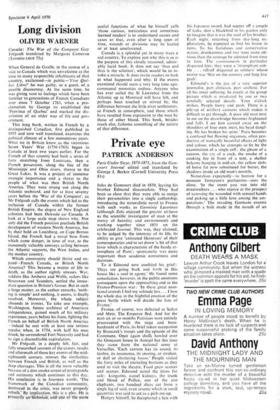Long division
OLIVER WARNER
Canada: The War of the Conquest Guy Fregault translated by Margaret Cameron (Toronto LOUP 75s) When General de Gaulle, in the course of a visit to Canada which was unwelcome at the time to many responsible inhabitants of that country, exclaimed—in public—'Vive Que- bec Libre!' he was guilty, as a guest, of a puerile discourtesy. At the same time, he was giving vent to feelings which have been familiar to generations of French Canadians ever since 7 October 1763, when a pro- clamation by George tit established the Province of Quebec' and marked the dis- solution of an older way of life and gov3 ernment.
This long book, written in French by a distinguished Canadian, first published in 1955 and now well translated, examines the political climate of a few momentous years. What we in Britain know as the victorious Seven Years' War (1756-1763) began in Canada at least two years earlier. For the French of that country had built a series of forts stretching from Louisiana, then a French possession, along the line of the Mississippi and Ohio rivers, thence to the Great Lakes. It was a project of immense strategic importance and a threat to the people of what was then British North America. They were strung out along the Atlantic seaboard, and for at least seventy years before the 'War of the Conquest', as -Mr Frdgault calls the events which led to the inclusion of Canada within the former British Empire, the slogan of New England colonists had been Delenda est Canada. A look at a large scale map shows why. Not only did the French position preclude British development of western North America, but by their hold on Louisburg, on Cape Breton Island, the French had a naval base from which came danger, in time of war, to the immensely valuable convoys sailing between the Atlantic seaports, the West Indies, and the mother country.
Which community should thrive and ex- pand—French Canada, or British North America? This became a matter of life or death, as the author rightly stresses. War, soldiers like Amherst and Wolfe, sailors like Boscawen and Saunders, settled the imme- diate question in Britain's favour. But in such a large matter, as the author remarks, 'noth- ing is simple' and nothing, it seems, is finally resolved. Moreover, the whole subject abounds in ironies. To take one example, Washington, future architect of American independence, gained much of his military experience, years before his fame, fighting the French on behalf of British North America —indeed he met with at least one serious repulse when, in 1754, with half his men drunk, he surrendered Fort Necessity and had to sign a discreditable capitulation.
Mr Fregault, in a deeply felt, fair, and fully researched account of the causes, results and aftermath of those key events of the mid- eighteenth century, stresses the similarities between French and British, as well as the deep cleavages. This is all the more valuable because of a dire smoke screen of propaganda and acrimony which continues to this day. His conclusion is in fourteen words. 'The framework of the Canadian community, destroyed in the crisis, was never properly rebuilt' By implication, this is a plea. He is primarily an•IiistdriaiV atid'obe df t mote useful functions of what he himself calls `those curious, meticulous and sometimes learned readers' is to understand causes and cases so that, even after a long span of time, wounds or divisions may be healed or at least ameliorated.
Canada is a splendid yet in many ways a sad country. To explore just why this is so is the purpose of this closely reasoned, admir- ably lucid book. It does not say 'thus and thus is the-solution', which would be to in- voke a miracle. It does invite readers to look at what happened and why. If the events examined should seem a very long time ago, communal memories endure. Anyone who has ever sailed the St Lawrence from the Atlantic up to Montreal will have felt, and perhaps been touched or stirred by, the difference between the little river settlements, so French in atmosphere, and those which have resulted from expansion to the west by those of other blood. This book, besides much else, fathoms something of the nature of that difference.


































 Previous page
Previous page